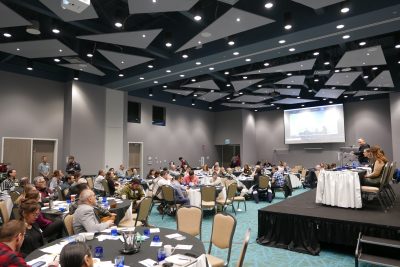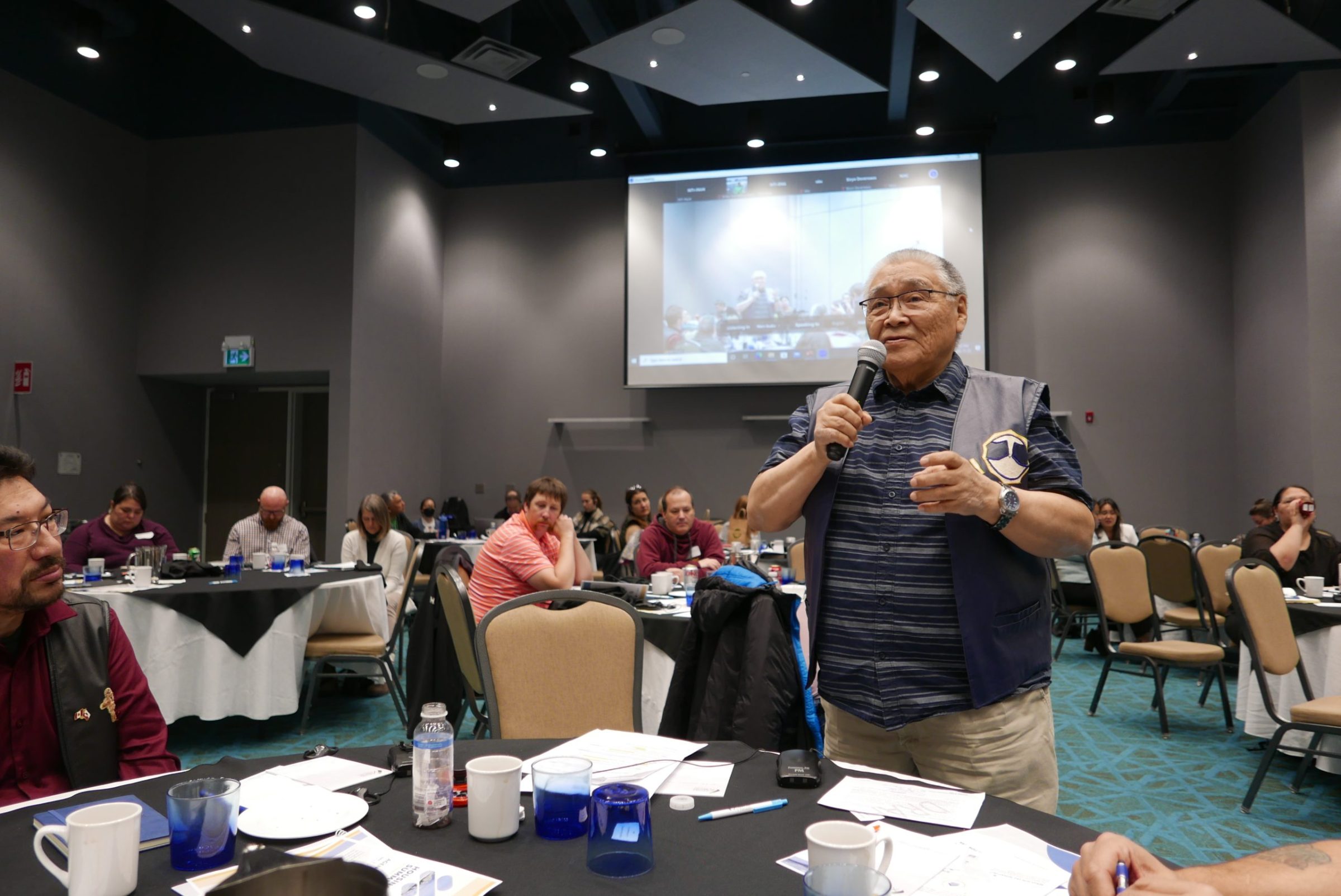Housing leaders talk partnerships, training at NTI summit
Two-day conference on housing held in Iqaluit Tuesday and Wednesday at the Aqsarniit hotel
James Eetoolook, Nunavut Tunngavik Inc. vice-president, closes off the final day of the housing summit in Iqaluit. (Photo by David Venn)
A Nunavut Arctic College dean delivered the message that it’s important to look toward future possibilities instead of what went wrong in the past, in speaking near the end of a two-day housing summit in Iqaluit Wednesday
Albert Netser, dean of construction trades at NAC’s Sanatuliqsarvik trades school, spoke during a question-and-answer session on building Inuit construction skills.
“We all know the problem, but if we think about the solution, I think we have the right people in play right now and everybody here is the right people to make changes.
“We can be finger-pointing on what has happened before, but I don’t want to focus on the past, I want to focus on what we have right now,” Netser concluded to a round of applause from the room of about 100 participants.

A panel from the Canada Mortgage and Housing Corp. answers questions about its role in solving Nunavut’s housing crisis. (Photo by David Venn)
The housing summit, hosted by Nunavut Tunngavik Inc., ran in Iqaluit on Tuesday and Wednesday at the Aqsarniit Hotel. The theme was enhancing intergovernmental co-operation.
Among those attending were representatives from the three regional Inuit organizations, Canadian and Nunavut governments, Inuvialuit Regional Corp., and NCC Development Ltd.
“If we don’t succeed in what we want to do, we are failures. We don’t want to be failures,” said NTI vice-president James Eetoolook.
On Wednesday, representatives of the Canada Mortgage and Housing Corp. fielded questions from participants about its different funding programs for building more housing.
Also, a Government of Nunavut Family Services Department official spoke on the challenges of having a large Inuit workforce in the trades, while NCC Development Ltd. presented on its Inuit training program in Resolute Bay.
NCC president and chief executive officer Clarence Synard spoke of the positive partnerships happening in the territory, such as the one his company has with the Nunavut Housing Corp. on Nunavut 3000, a framework that plans to build 3,000 more housing units in the territory by 2030.
“Yesterday, I’m sure, as it was for everyone here, was a heavy day,” Synard said of Tuesday’s summit discussions about homelessness, solving the housing crisis and community needs.
“You hear about a lot of the problems and the issues and the challenges. But I feel now that through partnerships … it’s those kinds of commitments and partnerships that are going to make a difference.”

Clarence Synard presents in an Aqsarniit hotel conference room Wednesday afternoon. (Photo by David Venn)





“Right people” in play, is political talk for “my buddies”. These “right people” have been in these positions for years and nothing has been done except exacerbate the crises even further. The housing crisis is man made by these “right people”. 3000 by 2030 is 8 years away, maybe Mr. Eetoolook can tell those people sleeping in shacks they have to wait another 8 years to get a home.
start from the premise that housing is not a right nor is ensuring you have a house the government’s responsibility. Accept personal responsibility that you need to work and make payments over 30 years to own property or that you need to be a good tenant to earn someone’s trust to live in their rentals. You need to take training and education opportunities and make family decisions to ensure economic conditions exist to enable you to be successful to afford housing. This culture in Nunavut that the government owes everyone man woman and child their own home or to house the entire population at $60 a month needs to end. No where else in Canada is 85% of all housing social housing. No job, no housing.
Totally agree. No work? No play.
Society owes you Nothing. Work.
“Take responsibility for your own actions”
Housing? Maybe local Housing boards can collect rent from tenants.
Was that $36 million tenants in Nunavut owe? Pony up instead of “hands out” for more, more, more….
@WillHunting I know a lot of people that are working and barely able to afford rent so they share the substandard housing that is available in Iqaluit. G.N, NHC, and these orgs need to create more housing stock to account for all the places they take off market rentals for transient workers, not to mention the complete lack of housing continuum Nunavut. More like Nunavut is 20 years behind the rest of the country, as usual.. These announcements make it seem like everyone should be thankful these “housing leaders” are aiming for new housing stock within the next 8 years. What a joke!
unfortunately if you work in a job that is so low paying that you can barely afford rent then you need to accept responsibility and look to upgrade. it is hard to think of jobs in nunavut like this outside of the service industry minimum wages as if you have grade 11 and are Inuit you can answer phones at the gn for 70-80k.
Try Vancouver or toronto or any place in canada we all live to barely make rent,,,allways been that way,,,and has got a lot worse the last few years
I would agree with you IF the federal Government had not forced Inuit into communities. As soon as the Government did this, and began providing housing for the purpose of Arctic Sovereignty they burdended themselves for eternity. They wanted human flag poles and they got them in Public Housing. This is the situation it has created, and it is 100% their problem to solve it.
Part of me wonders are they purposely keeping the public housing conditions terrible to hope people will go out on their own to buy a home? I don’t know but I do not see how the Federal Government now administered by the GN can actually get out of this cycle they created.
The twisted thinking and mental gymnastics of entitlement on display for all to see. So deeply pathetic.
I agree with the sentiment of your comment, and while there is certainly some “twisted thinking and mental gymnastics” apparent in the original comment, the main issue in my view is the fatalism and lack of faith in human ingenuity. If you start with that assumption, there truly is no way out.
I hear this a lot but there is as much mythology as there is fact in saying Inuit were “forced” to do anything. What I understand is that many Inuit were relocated on consent but sometimes under false pretences. Okay, that happened but why in 2022 should the descendants descendants be given free housing? At what point did the federal government agree or sign up to pay for this? where is it in the 1995 Nunavut Land Claim Agreement negotiated by Inuit? Nowhere.
.
None of it adds up unless you blame a lifetime of poor choices and squandered opportunities on the big bad government and “southerners”.
.
Get a job!
In many cases Inuit flocked to the new settlements where southerners had set up trading posts, dew line operations and Missions.
Why? They sought a more stable life. So they built up houses using the scrap wood and metal they could find, unfortunately these were barely adequate, and this inadequacy forced the government to do something for them, so they built them cheap little homes, better but often still inadequate.
Still, the ‘fault’ for all this was pinned on the government and there it remains to this day.
Unfortunately many Inuit barely know their own recent past (or much history at all), beyond a standard set of simple narratives that always place them in the role of victim.
Please stop blaming and take responsibility for your own actions. Hug a qallunaaq today.
“We all know the problem, but if we think about the solution, I think we have the right people in play right now and everybody here is the right people to make changes.” The same people have been in the room for decades and nothing has changed. These guys epitomize the well-known definition for insanity, by doing the same thing over and over and over again and expecting a different result.
This thread sounds like 1 person talking to themselves lol
Stop with the bs comments and just realize that,
1- yes, we’re in this housing predicament because of colonialism- it’s not a secret anymore that Canada forced assimilation upon all natives
2-the old geezers that have been holding onto power for the past 3 decades are finally retiring and their old ways of operating will finally be gone- good riddance
3-times are changing and the Nunavut3000 is a great initiative…time will tell if it can be pulled off….I’m in favour of it and hope that it is successful!
Employment and education on the job and housing for all of Nunavut! LFG!!
It is not a secret and has never been a secret – old story.
We are in this predicament because of the irresponsible Nunavummiut who keep having children with no consideration of how to house or feed them. Children having children is one of the largest causes of our social issues.
Old story that has yet to be fully resolved. “Sorry not sorry-we forced you to adapt to western society-we won’t fix what we caused though-lets just keep sending billions of dollars away to help other countries, instead of pumping those dollars into much needed infrastructure and housing to the folks we forced to adapt to our western way of life- all just within the last century to boot”
Buddy, realize that me and my people were living off the land less than a century ago. How many years did your people have to adapt to forced assimilation and learn how to adapt to western society?
Just take a moment and ask yourself that before you start bashing my people. I’m not a racist, I understand that you need to get educated to succeed in western society. We’ll get there. Have them empathy on how much change we’ve gone through this past 100 years.
I cringed at your statement.
My family has been in this country since 1979 after fleeing Vietnam. I was born here in 1981 – the first of my family. My 4 older siblings were all born in Vietnam or in refugee camps in Thailand. My two younger brothers were born in Scarborough.
Don’t ever presume to tell me how difficult adapting is. My parents went from a war-ravaged countryside life where dung was the primary cooking fuel to full-on 1980s Canadian life with a different language, weather, geography, culture, support networks, and everything else that you can think off. They have retired from very successful small businesses. You have no idea of the changes that they went through in the space of about 10 years. They would have been thrilled to have had 100 years to adjust to such changes. We almost never speak of this as life and conditions have changed and that is just the way it is.
I have not bashed; I have made an observation. Large families were traditionally how it was done for a rural agricultural people. That is not how it is done anymore in the Canadian – Vietnamese community. We understand that conditions have changed – as they have in Nunavut.
Finally, you seem to have a very Eurocentric view of the world and think that everyone on here is a white person of old-stock European descent. That sort of thinking doesn’t not reflect the reality of Canada anymore. Things have changed, and we all need to change with them.
My father did not have indoor plumbing until the 1960s. It is not as if “white” Canada was some sort of utopia until the last 49 years.
I’m sorry there was a need to adapt to having electricity, indoor plumbing, efficient structures, motorized vehicles, fruits and vegetables, aircraft, barges, telephones, internet, healthcare and medicine, policing, social programs, education, business opportunities, investment. Inuit have multiples as much or more than 4x post colonization. it appears to have had only negative impacts and effects over what the land and climate supported 200 years ago.
Lots of pretty words, with no substance and with a target date beyond the next election of everyone involved. So, no responsibility and no accountability.
.
Fact 1. Until we are able to house an additional 1,000 people every year, we will continue to fall further behind.
.
Fact 2. Until the supply of houses exceeds the demand for houses, providing more money will drive up the price of the houses that do exist.
.
Fact 3. Reducing the cost of building houses in Nunavut will be opposed by those who have “invested” in home ownership, because the re-sale price of their house would go down.
.
Fact 4. Houses in Nunavut used to be built with 4 or 5 bedrooms. A few years ago they were built with two or three bedrooms. Now they are being built with one or two bedrooms. But Inuit are still living up to 20 people to a house.
.
Question 1. Where will people live? Which current communities? Where will new communities be built?
.
Question 2. What will be done to reduce the cost of each serviced building lot?
.
Question 3. What will be done to reduce the cost of material to be used in building houses in Nunavut, without reducing the suitability of the houses?
.
Question 4. What will be done to reduce the cost of getting building material to the construction site?
.
Question 5. What will be done to enable Nunavummiut to build the houses, so the labour money stays here?
.
Question 6. What will be done to enable Nunavummiut to invest in house construction, so we don’t have to borrow from others?
.
Question 7. When will “the right people” start providing answers to these questions?